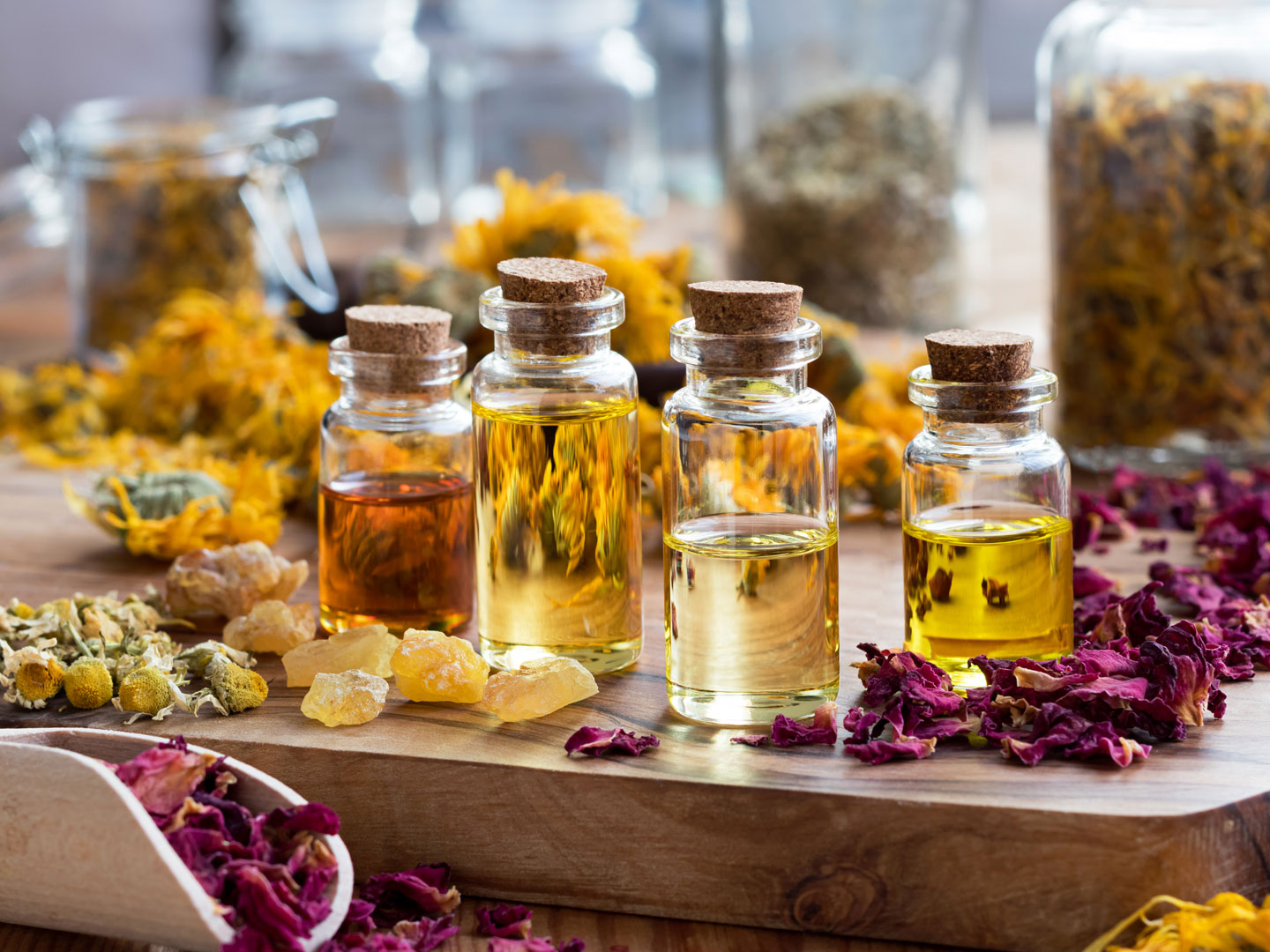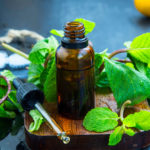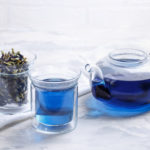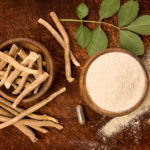Peppermint
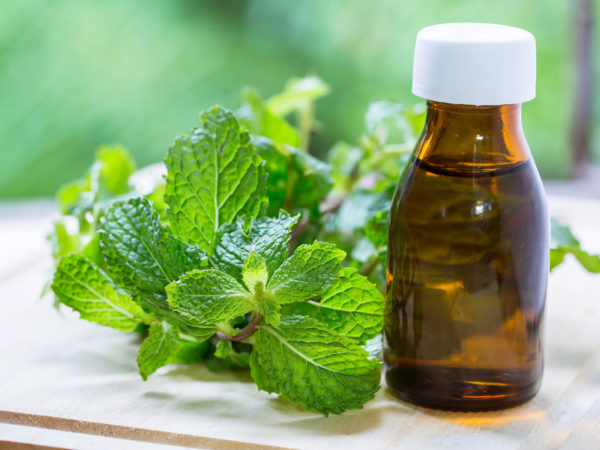
Peppermint (Mentha piperita)
Mint (Mentha) is a perennial herb indigenous to Europe that has spread worldwide, with over 25 different species across the globe. The two most common varieties are peppermint (Mentha piperita) and spearmint (Mentha spicata).
Peppermint oil is a natural hybrid of spearmint. It is more potent, containing the aromatic oil menthol, whereas spearmint contains a similar but weaker chemical, carvone. This is why peppermint oil is associated with culinary and medicinal use, while spearmint is more commonly used only as a flavoring in simple products such as gums and candies. The dried leaves of the peppermint plant have been used medicinally for thousands of years. Its main compound is menthol, which reduces smooth muscle contractions via the blocking of calcium channels, thereby providing an antispasmodic effect in the digestive tract.
Uses For Peppermint:
Peppermint is used in a wide variety of applications, from oral ingestion to commercial purposes in fragrances. Peppermint is a wonderful digestive remedy, especially useful for the relief of irritable bowel syndrome (IBS), indigestion, and nausea. Be aware that peppermint tea can worsen the heartburn experienced with gastroesophageal reflux disease (GERD) because it relaxes the lower esophageal sphincter, allowing stomach acid to leak back into the esophagus; it may also promote flow of bile from the gall bladder and complicate gallstones – consult your doctor before using peppermint if you have these conditions. When using peppermint for IBS, choose enteric-coated capsules, as they pass relatively intact into the intestinal intact, releasing their contents once there. It is also used to treat intestinal bacterial overgrowth and gastrointestinal cramps. Peppermint oil has a strong aroma and is often used as a chest rub inhalant for the treatment of cough and colds and as an analgesic for pain. Some studies suggest that inhaling aromatics might relieve nausea after surgery, but data supporting peppermint oil in this situation are weak. Preliminary studies suggest that it may have anti-cancer properties, but much more research is needed. Peppermint oil is used topically for aches and pains including headaches, toothaches, rheumatic conditions, as well as for repelling mosquitos. In Ayurvedic medicine, peppermint has been used both as a stimulant and to help clear the mind and promote emotional harmony. It is a popular sleep aid, especially when drunk in tea form. Nutritionally, peppermint (and spearmint) are good sources of vitamins A and C, along with manganese and copper.
Peppermint Is Available In:
Peppermint is available in teas, enteric-coated capsules of oil, essential oils, creams, and rubs.
Peppermint Herb & Drug Interactions:
Never ingest undiluted peppermint oil. Peppermint oil taken orally can cause heartburn, nausea, and vomiting, but enteric-coated capsules can reduce the incidence of these side effects. As mentioned above, peppermint, including peppermint tea, may worsen symptoms of gastroesophageal reflux disease (GERD). Peppermint may also promote the flow of bile from the gall bladder and complicate gallstones. Perianal burning has been reported. Recently concerns have been raised about the potential for liver toxicity in some people – those with existing liver disease should consult their doctors before using peppermint.
Some studies have shown possible interactions between peppermint and the metabolism of certain pharmaceutical drugs. Patients on proton pump inhibitors, statins, or non-steroidal anti-inflammatory drugs should avoid high dosages of peppermint in any form. Users with achlorhydria, in which gastric acid is low or absent, should also avoid peppermint.
Use of topical peppermint oil may cause skin irritation (dermatitis) in some persons.
Excessive consumption of candies containing peppermint oil has been associated with cases of stomatitis, which is an inflammation of the mucous lining of the mouth.
Preliminary research on male animals suggests that peppermint may reduce testosterone levels. The effects in humans are unknown, but anecdotal reports suggest some men experience decreased libido when consuming large quantities (at least four cups daily) of peppermint tea. Early research also suggests potential effects on levels of follicle stimulating hormone and luteinizing hormone.
Peppermint should not be given to babies or young children. The menthol it contains can cause a choking sensation. Peppermint oil should not be directly applied anywhere near the nose or mouth of infants because of the risk of apnea, bronchospasm, and respiratory depression.
Pregnant women and nursing mothers should not ingest peppermint oil in excessive amounts.
When Buying Peppermint:
Choose peppermint oil containing at least 44 percent free menthol or teas made from 100 percent pure peppermint leaves.
You can buy pure peppermint leaf tea in most supermarkets. Brew it in a covered container to avoid loss of rapidly evaporating components and drink as much of it as you like, hot or iced.
Dosage:
Adults can take one to two capsules of enteric-coated peppermint oil between meals for indigestion and use chest-rub formulations as needed for congestion due to the common cold. Use creams or ointments as directed. Alternatively, brew a cup of fresh peppermint tea – hot, warm, cooled or iced.
Dr. Weil Says:
Because peppermint is so ingrained in our minds as an ingredient in candy or gum, it is difficult to seriously consider it an effective and first-line treatment for stomach upset. However, peppermint calms the stomach and digestive tract, making it ideal for indigestion and discomfort following a heavy meal. Before you reach for the antacids in this situation try peppermint tea – it just might help. If your symptoms are due to GERD, however, avoid peppermint.
SOURCES:
ConsumerLab. Peppermint. consumerlab.com/tnp.asp?chunkiid=21838
E-How Health – Peppermint Aromatherapy Essential Oils and Headaches – http://www.ehow.com/video_7411123_peppermint-aromatherapy-essential-oils-headaches.html
Natural Database – naturaldatabase.therapeuticresearch.com/nd/Search.aspx?cs=NONMP&s=ND&pt=100&id=705&fs=ND&searchid=37423312
Natural Health, Natural Medicine: The Complete Guide to Wellness and Self-Care for Optimum Health. By Andrew Weil, MD.
University of Maryland Medical Center – umm.edu/altmed/articles/peppermint-000269.htm
Alternative Therapies Column. Peppermint oil for treatment of irritable bowel Syndrome. Am J Health Syst Pharm 2016;73;22-31.
Charrois TL, Hrudey J, Gardiner P, et al. Peppermint oil. Pediatrics Rev 2006;27;e49.
Fundukian LJ (Ed.). The Gale Encyclopedia of Alternative Medicine (2nd ed.). 2009;3:1029-1771.
Gardiner P. Peppermint (Mentha piperta). Longwood Herbal
Task Force; 2000. Available at: ongwoodherbal.org/
peppermint/peppermint.pdf.
Hines S, Steels E, Chang A, et al. Aromatherapy for treatment of postoperative nausea and vomiting. Cochrane Database Syst Rev. 2012 Apr 18;(4):CD007598. doi: 10.1002/14651858.CD007598.pub2.
Kearns GL, Chumpitazi BP, Abdel-Rahman SM, et al. Systemic exposure to menthol following administration of peppermint oil to
paediatric patients. BMJ Open. 2015; 5(8): e008375. Published online 2015 Aug 12. doi: 10.1136/bmjopen-2015-008375.
Khanna R, MacDonald JK, Levesque BG. Peppermint oil for the treatment of irritable bowel syndrome: a systematic
review and meta-analysis.
Yi W, Wetzstein HY. Anti-tumorigenic activity of five culinary and medicinal herbs grown under greenhouse conditions and their combination effects. J Sci Food Agri 2011;91:1849-1854.
Reviewed by Russell Greenfield, M.D., August, 2016.


